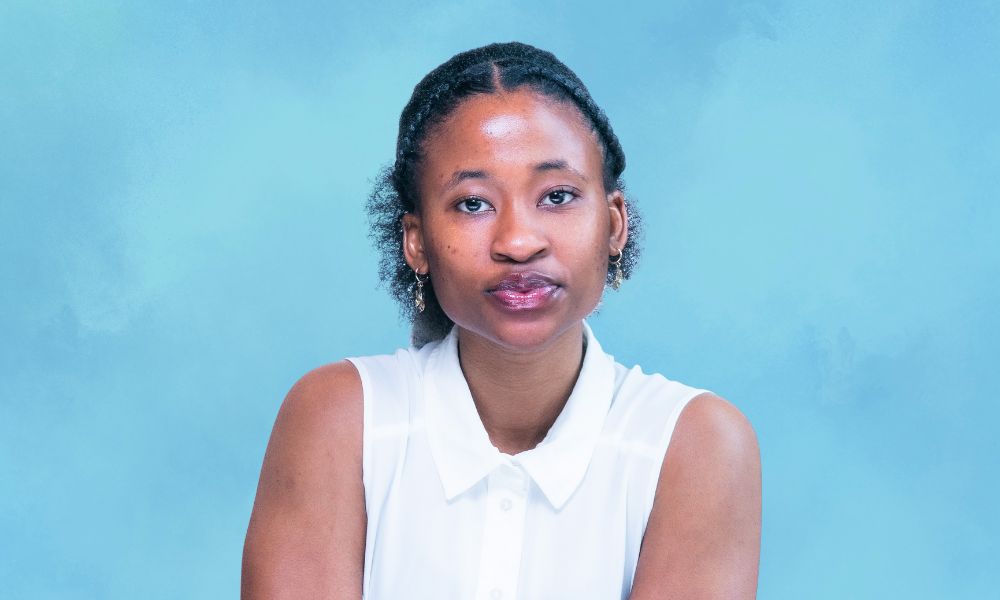
Major: B.S. in Forensic Science
Mentor: Peter Diaczuk, Ph.D., Professor of Forensic Science
Programs: CUNY Immersive Research Experience (CIRE), Honors Program, Program for Research Initiatives in Science and Math (PRISM)
Hometown: Brooklyn, NY; Haiti
Career Aspiration: Special Agent, Air Force Office of Investigations
What was life like before John Jay?
I was born in Haiti and moved to the U.S. when I was nine years old—my grandfather was a U.S. citizen and sponsored our family. My mom decided she would stay behind and that I should come to the U.S. She gave up custody so my sister and I could come here and find a better life.
Thinking about my upbringing in Haiti, I didn’t really have time to dream about my future, but that all changed when I came to the U.S. Here, I could have goals and aspirations. I started watching shows like CSI Miami and was amazed by the cool work done by medical examiners. They could get answers from a person’s body. So, from a very young age, I knew I wanted to work in forensics in some way.
Why John Jay?
In seventh grade, I participated in the school’s door decorating contest. As a class, we had to pick a college and decorate our classroom door using the information we found about the college. After speaking with our teacher, who was a John Jay College alumna, we chose John Jay. Since that moment, the college was on my radar. I admired John Jay College’s focus on criminal justice, the research opportunities it offered its students, and the fact that it was located in the city.
What sparked your passion for science and molecular biology?
Watching shows like CSI Miami introduced me to the world of forensic science, but it was a chemistry course I took in high school that made me fall in love with science. The teacher made the class engaging and taught us how other sciences, like earth science, were all connected. He showed us how science could explain the world. Learning the different concepts, understanding why the tides shift depending on the moon’s phase, or seeing how chemical bonding works, was fascinating.
What are you currently researching?
I’m working with my mentor, Dr. Peter Diaczuk, researching whether the marks left on a bullet change if the barrel of a gun is lubricated, over-lubricated, or dry. So, when you use a firearm and fire it, the weapon leaves marks on the bullet as it comes out of the barrel. Those marks can be used to identify the weapon because different barrels leave different patterns on bullets—almost like a fingerprint. We’re exploring whether those markings change if the barrel is lubricated or over-lubricated. The thinking is the oil decreases the friction or interactions between the casing and the barrel, changing the barrel’s marking on the casing. If forensic examiners are testing suspected weapons, the only way to come to the most just and correct conclusion would be to have examiners test the weapons in many different conditions.
Dr. Diaczuk has been so helpful throughout this research process and an incredible source of information. He’s provided me with an abundance of research materials and fired the weapons in different conditions on my behalf. Getting to do this kind of research with him, one that could possibly lead to a more just investigative process, is so meaningful.
What has the CIRE experience been like?
There’s a real dedicated commitment to seeing students excel as researchers. Getting a chance to get in 400 hours of research, attend different trainings and workshops, and meet with faculty, administrators, and students from across CUNY has been a profound and transformative learning experience. We recently attended a CIRE meeting where we talked in-depth about research ethics, how to write a proposal, expand your research network, and get your work published. For many students in the room, it was the first time learning these things, so as CIRE scholars, we’re being presented with an incredible opportunity to learn and grow as researchers.
What do you want others to know about CIRE?
CIRE gives students more opportunities to immerse themselves in meaningful research and take their studies to a new level. Students, especially students who are typically underrepresented in STEM fields like forensic science, will be able to gain the skills needed to expand their talents as researchers. Talented students often have the willpower and work ethic to excel, but they’re not given the access or opportunities to show off their talent. CIRE is opening the doors of opportunities for so many, and I know it will help enrich and diversify the STEM fields. That diversity will improve those fields and make them better.
What compelled you to serve in the Air Force and what duties do you perform?
I grew up in a third-world country and saw political unrest and people struggling to pay for their kids’ education—my mom had to pay for my school three times a year, and the tuition was so expensive. When I came to the U.S., a week after arriving I was going to public school and learning. As I got older, I realized I wanted to do something to essentially thank this country for all the opportunities. I’m so appreciative of everything it’s given me, and I am proud to be an American citizen. I feel like one of the ways to give back is to serve.
I’m currently a cadet wing commander in the Air Force. So, I’m the top cadet in charge, overseeing training and cadets, developing group leadership projects, and coordinating programs. Through the Air Force ROTC, I’ve had a chance to do many things—go to the Air Force Academy, meet generals, and even visit other countries like Morocco. Once I graduate from John Jay, I’ll be commissioned as a second lieutenant and work for the Air Force Office of Special Investigations. I’ll get federal law enforcement training, work in criminalistics, and eventually specialize in forensics.
Where do you see yourself in 10 years?
I see myself as a captain in the Air Force, possibly going on to work in a three-letter agency like the CIA and settling down and having kids.



